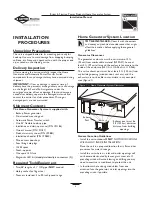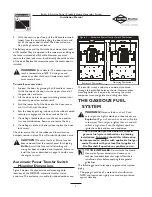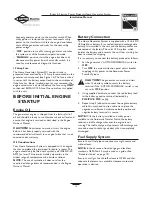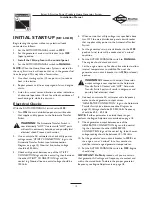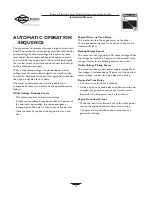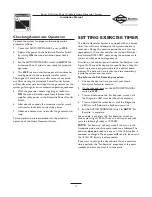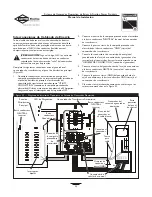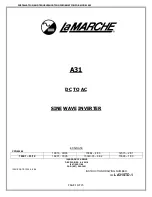
18
Briggs & Stratton Power Products Home Generator System
Installation Manual
RECONFIGURING THE
FUEL SYSTEM
The engine of your Home Generator System is factory
calibrated to run on natural gas (NG). It may also be
operated on liquefied petroleum (LP).There is no additional
hardware/equipment required to switch between either
fuel. However, LP fuel inlet pressure must be between
11 and 14 inches water column.
To reconfigure the fuel system for LP use:
• Set the AUTO/OFF/MANUAL switch to OFF.
• Set the generator’s main circuit breaker OFF.
• Remove the 15 Amp fuse.
• Activate the fuel transfer solenoid as follows:
1. Remove the “Oil Service” access panel.
2. Join the two-pin electrical connector shown in
Figure 17.
3. Reinstall the “Oil Service” access panel.
• Reinstall the 15 Amp fuse.
• Set the generator’s main circuit breaker ON.
• Set the AUTO/OFF/MANUAL switch to AUTO.
The system is now ready to operate automatically using LP
fuel.With a fixed main jet for LP gas, there is no need to
perform any engine adjustments for LP operation.
Engine Adjustment
It is commonly known that there are regional variances in
the combustibility of natural gas. Each HGS unit is adjusted
at the factory for correct NG operation. If the generator
output voltage or frequency measured during initial
Electrical Check (paragraph #8 on page 15) is outside the
listed ranges, the combustibility of the gas supplied at the
installation site may be substantially different.
To adjust the engine for this different fuel, proceed as
follows.
1.
Remove the Air Intake access door.
2.
Remove the three M5 sheet metal screws that hold
the control panel wiring cover to the air intake guard
(Figure 18).
3.
Remove the six (M5) sheet metal screws that hold the
air intake guard to the engine impeller panel.
4.
An access hole is visible above the engine impeller
panel (see Figure 18). It will be covered with a plug.
Remove the plug to gain access to the adjustment
screw.
NOTE: The mixture adjustment screw is the brass slotted
screw in the center of the aluminum boss directly visible in
the access hole.
Figure 17 — Fuel Transfer Solenoid Connection
Push two
connectors
together
Figure 18 — Accessing Engine Mixture Control
Remove
Access
Hole Plug

